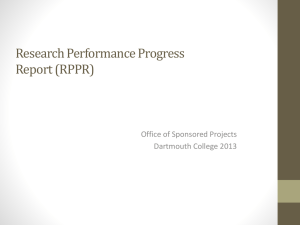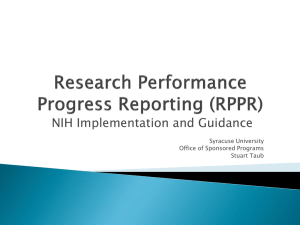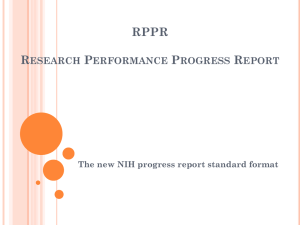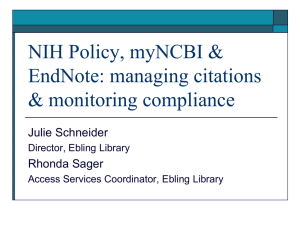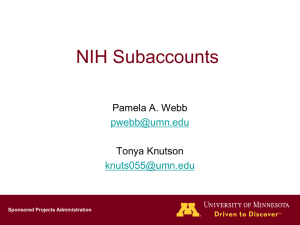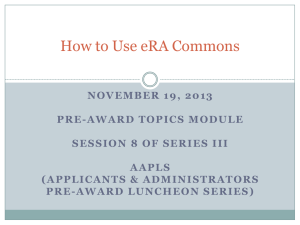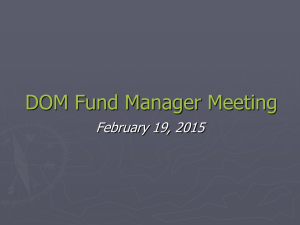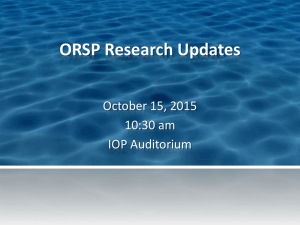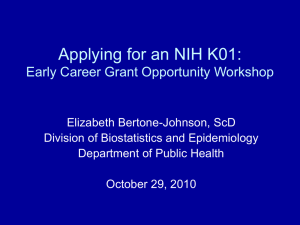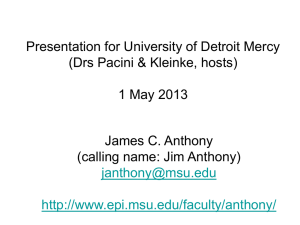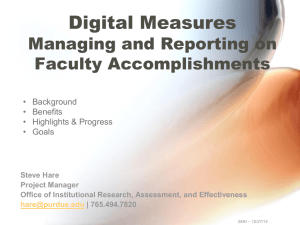Full PowerPoint slides - Sponsored Projects Administration
advertisement
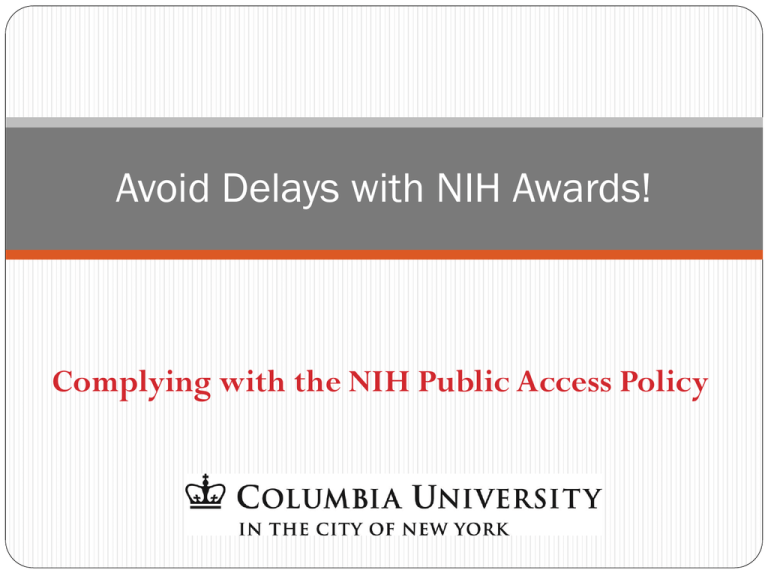
Avoid Delays with NIH Awards! Complying with the NIH Public Access Policy Presenters Stephanie Scott Communications & Outreach Director Sponsored Projects Administration (SPA) sfs2110@columbia.edu Dina Matsoukas Head of Reference and Education Coordinator Augustus C. Long Health Sciences Library hs-library@columbia.edu 2 10 Points to Cover Today 1. 2. 3. 4. 5. Introduce the Enhanced Public Access Policy Review the Current Policy How to Demonstrate Compliance How to Ensure Publications Become Compliant What is MyNCBI? 6. 7. 8. 9. 10. Demo MyNCBI Action Plan for Non-compliant Publications Review the RPPR Review the PRAM Review MyBibliography PDF Report Our website contains many resources, including training materials and videos: http://spa.columbia.edu/nih-public-access-policy 3 1. Introduce the Enhanced Public Access Policy 4 Why are we here? NIH Enhanced Public Access Policy See latest notice: http://grants.nih.gov/grants/guide/notice-files/NOT-OD-13- 042.html Non-competing awards will be delayed if publications are out of compliance at time of progress report submission! Publications must demonstrate compliance in the progress reports Enhanced policy happening in tandem with the mandate of the Research Performance Progress Reports (RPPR) for SNAP awards and fellowships Non-SNAPS must include a new report generated from MyNCBI with the paper PHS2590 progress reports to demonstrate compliance: PDF report 5 When does this enhanced policy take effect? Applies to all NIH awards with budget start dates of 7/1/2013 or later! For SNAP Awards – Mandatory Use of the RPPR for SNAP and Fellowship Awards begins this May http://grants.nih.gov/grants/guide/notice-files/NOT-OD-13035.html http://grants.nih.gov/grants/rppr/ Electronic format only Replaces PHS 2590, including use of eSNAP module, and 416-9 for Fellowships RPPR has been available since October 2012. Have you tried it yet? For non-SNAP, policy applies whenever the progress report is due for a budget start date of 7/1/2013 or later. 6 2. Review the Policy that went into effect 4/7/2008 7 The NIH Public Access Policy Is Mandatory The Policy implements Division G, Title II, Section 218 of PL 110-161 (Consolidated Appropriations Act,to2008) which states: Where to Make What Submit When to Submit Public When to Make The Director of the National Institutes of Health shall require that all investigators funded by the NIH submit orPublic have submitted for them to the National Library of Medicine’s PubMed Central an electronic version of their final, peer-reviewed manuscripts upon acceptance for publication, to be made publicly available no later than 12 months after the official date of publication: Provided,That the NIH shall implement the public access policy in a manner consistent with copyright law. NIH Guide Notice NOT-OD-08-033 http://grants.nih.gov/grants/guide/notice-files/NOT-OD-08-033.html NIH Guide Notice NOT-OD-09-071 announces the policy is permanent, per the Consolidated Appropriations Act, 2009 http://grants.nih.gov/grants/guide/notice-files/NOT-OD-09-071.html 8 8 PubMed vs. PubMed Centrald and PubMed Central (PMC) [ Free resources developed by the U. S. National Library of Medicine • Database of biomedical journal citations, abstracts, and • Links to some full text articles from PMC and publisher websites. • Unique identifier: PMID followed by a series of numbers. • Digital archive of full-text, peer-reviewed journal papers. • Unique identifier: PMCID followed by a series of numbers. 9 Definitions: Article Types Final Peer-Reviewed Manuscript: ACCEPTED FOR PUBLICATION Author’s final manuscript of a peer-reviewed paper accepted for journal publication Includes all modifications from the peer review process Submitted by Authors and Publishers/Journals to PMC Final Published Article: Journal’s authoritative copy of the paper Includes all modifications from peer review and the publishing process: copyediting, stylistic edits, and formatting changes Submitted by Publishers/Journals to PMC 10 What Does "Peer Reviewed" Mean? Peer Review is a process that journals use to ensure the articles they publish represent the best scholarship currently available. The editors of the journal send it out to other scholars in the same field (the author's peers) to get their opinion on the quality of the scholarship, its relevance to the field, its appropriateness for the journal, etc. Publications that don't use peer review just rely on the judgment of the editors 11 3. How do you demonstrate compliance? 12 How do you demonstrate compliance? Must use MyNCBI in order to link publications to eRA Commons For RPPR progress reporting Must use MyNCBI’s PDF report For grants not subject to the RPPR at this point in time Must associate publications to grants Three ways to do that Publications must be cited appropriately If published, use PubMed Central Reference # (PMCID) If in press, or published within 3 months or report submission: PMC Journal - In Process (Methods A & B) 13 a valid NIH Manuscript Submission System reference number (NIHMSID) (Methods C & D) How do I associate NIH grants to the publications? Three different ways: 1. Through NIHMS – 1st step is to link the manuscript to an NIH grant 2. In MyBibliography of MyNCBI 3. In the RPPR – live feed of publications from MyNCBI, can associate the grant to the publication, which will feed back to MyNCBI (a two-way feed) 14 4. How do you make sure publications become compliant? 15 How Awardees Comply Address Copyright Deposit Paper Upon Acceptance for Publication Method A: Publish in a journal that deposits all NIH-funded final published articles in PMC without author involvement. Method B: Make arrangements to have a publisher deposit a specific final published article in PMC. Method C: Deposit the final peer-reviewed manuscript in PMC yourself via the NIHMS. Method D: Complete the submission process for a final peer-reviewed manuscript that the publisher has deposited via the NIHMS. Cite Article 16 Institutions and investigators are responsible for ensuring full compliance with the Public Access Policy (e.g., that any publishing or copyright agreements are consistent with submitting to PMC). Include the PMC number (PMCID) for applicable papers in applications, proposals and reports, as described at http://publicaccess.nih.gov/citation_methods.htm. 16 Address Copyright Before an author signs a publication agreement or similar copyright transfer agreement, make sure that the agreement allows the final peer-reviewed manuscript to be submitted to NIH in accordance with the Public Access Policy. We encourage authors to consider What submission method will be used? What version of the paper will be made available on PMC? Who will submit the paper? When will it be submitted? Who will approve the submission? When can the paper be made public on PMC? 17 17 Overview of Submission Methods Method A 18 Method B Method C Method D Version of Paper Submitted Final Published Article Final Published Article Final PeerReviewed Manuscript Final PeerReviewed Manuscript Task 1: Who deposits the paper? Publisher direct to PMC Publisher direct to PMC Author or designee, via NIHMS Publisher, via NIHMS Task 2: Who approves paper for processing? Not Applicable Not Applicable Author, via NIHMS Author, via NIHMS Task 3: Who approves paper for Pub Med Central display? Not Applicable Not Applicable Author, via NIHMS Author, via NIHMS Participating journal/publish er Method A Journals Make arrangements with these publishers Check publishing agreement Check publishing agreement 18 How to cite papers in press, or within 3 months of publication… For Method A and B Journals, use “PMC Journal - In Process”. Example: Sala-Torra O, Gundacker HM, Stirewalt DL, Ladne PA, Pogosova-Agadjanyan EL, Slovak ML, Willman CL, Heimfeld S, Boldt DH, Radich JP. Connective tissue growth factor (CTGF) expression and outcome in adult patients with acute lymphoblastic leukemia. Blood. [a publication date within 3 months of when the application, proposal or report was submitted to NIH]. PMCID: PMC Journal - In Process For Method C and D Journals, use the NIHMSID. Example: Cerrato A, Parisi M, Santa Anna S, Missirlis F, Guru S, Agarwal S, Sturgill D, Talbot T, Spiegel A, Collins F, Chandrasekharappa S, Marx S, Oliver B. Genetic interactions between Drosophila melanogaster menin and Jun/Fos. Dev Biol. In press. NIHMSID: NIHMS44135 NIHMSIDs will not be accepted 3 months after publication. 19 PMCIDs are assigned around the time of publication. Please use the PMCID once it is assigned. 5. What is MyNCBI? 20 What is My NCBI? A tool integrated with PubMed to track literature searches, collections of citations, and public access compliance. Key features for our discussion: Can be linked to eRA Commons accounts Commons linked users can associate publications with 21 NIH grants Tracks NIH Public Access compliance The only way to enter publications into RPPR Creates the publications section (Section E) of PHS 2590s Other time savers: Delegation, options to share and publish bibliographies, automate searches, etc. 6. MyNCBI Demo 22 What you should do now: •Create a MyNCBI account (if you don’t have one) •Link your MyNCBI and eRA Commons accounts •Add delegates to your MyNCBI account (if you wish) •Get all your citations into your MyNCBI bibliography •Identify your citations that arose from NIH funding • Use “Add Award” to associate NIH grant with the citation •Review Public Access Compliance status of citations •Address any non-compliant citations 23 • Create a MyNCBI account (if you don’t have one) 24 Link your My NCBI and eRA Commons Accounts 25 26 27 Add delegates to your MyNCBI account (if you wish) 28 Get your citations into your MyNCBI bibliography 29 Associate all relevant citations with their respective NIH awards 30 Review the Public Access Compliance status of each citation 31 32 ? - Public Access Compliance “No funding has been associated with this citation”...yet 33 Address any non-compliant citations 34 Some things to remember... Need to get PMCID#s for ALL papers to which the NIH Public Access Policy applies. Policy applies to paper “accepted for publication” (not published) on or after April 7, 2008 so a paper published in July 2008 but accepted in Feb. 2008...does not fall under the policy If a manuscript has already been submitted to NIHMS by a co-author who did not complete the NIHMS process: the paper will remain stalled in NIHMS until all steps are completed the author who approved the initial upload will remain the “NIHMS person” unless a co-author claims it from them due to unresponsiveness 35 7. Action Plan for Non-compliant Publications 36 How the library can help... Verify applicability of the Policy to the particular paper. Verify publisher permissions with regards to whether uploading to NIHMS by author is permitted, and if so, which version is allowed (final peer-reviewed manuscript or published version) Suggest how best to contact particular publisher (to request publisher deposit) if author upload is not permitted. Initiate submission of manuscript to the NIHMS system on behalf of author(s) (or identify the NIHMS person via the PACM tool) will need manuscript files (separate files for tables & figures) grant number info contact of author who will be approving the upload Troubleshoot any publication-related issues that arise using NIH tools (MyNCBI, NIHMS, etc) 37 8. Review RPPR 38 RPPRs Available Now – if report is due in May, do not select the eSNAP option!!! Activity Codes R01-like SNAPs D71, DP1, DP5, G08, G11, G13, P40, R00, R01, R03, R18, R21, R33, R34, R36, R37, R56, RC1, RC2, RL1, S10, S21, S22, SC1, SC2, SC3, UB1, UC2, UH1, UH2, UH3, UP5, P01, P20, P30, P40, P41, P50, PL1, R24, S11, U01, U10, U19, U24, U34, U54 Individual K SNAPs K01, K02, K05, K06, K07, K08, K18, K22, K23, K24, K25, K26, K99, KL1 Education SNAPs D43, K30, R13, R25, RL5, T14, T36, U13, U2R Fellowships F05, F30, F31, F32, F33, F34, F37 SBIR/STTR SNAPs R41, R42, R43, R44, U43, U44 39 What about non-SNAP awards? RPPRs will be implemented for non-SNAP late 2013/early 2014 Includes T32s and other complex mechanisms The progress reports for these grants require budgets, unlike the SNAP awards and fellowships NIH trying to incorporate the SF424 budget forms into the electronic RPPR, but they are not there yet! Continue to submit the progress reports for these special grant mechanisms as you have been HOWEVER, these progress reports will require a PAPER PDF printout from MyNCBI to demonstrate that publications are compliant with the Public Access Policy: http://www.nlm.nih.gov/pubs/techbull/nd12/nd12_myncbi_pdf.html 40 Summary of New Information Requested • Competitive revisions/administrative supplements • Specific location to report aims & accomplishments (B.3) • Foreign Collaborations: • Individual affiliation with foreign organization (D.1) • Dollar amount of award spent in foreign country (E.4) • Information about foreign components (G.9) • Participants – role on project • New role-High School Student; slight rewording of other roles (D.1) • Level of Effort • Prior approval request for reduction of >25% for PD/PI or other individual designated on NoA (D.2.a) • Estimated unobligated balance 41 • Provide estimated amount and description of how funds will be spent (G.10) Points to Remember • Special characters not permitted in text boxes • will not display properly in final PDF • Disregard items marked “Not Applicable” • Round person months to nearest whole number • Follow instructions, e.g., only report publications under C.1 Publications • All uploads must be PDF files • Fellows are often unfamiliar with eRA Commons modules and MyNCBI 42 Sample RPPR Let’s review a sample report http://grants.nih.gov/grants/rppr/rppr_screen_shots.pdf 43 RPPR and E Notification Trigger: When a grantee submits a RPPR to NIH that associates 1 or more publications with the award for which the public access compliance status is “Noncompliant”. Recipients: to the PD/PI, with a cc to the AO, SO, GMS, IC mailbox, and PO. Response: The grantee may respond to the eNotification via email or through the Progress Report Additional Materials (PRAM) link. 44 9. Review PRAM 45 What is PRAM? Progress Report Additional Materials (PRAM) An option in the eRA Commons for communicating with the NIH Grants Management Specialist, and providing additional materials for a progress report. At this point in time, the PRAM is ONLY being used to address non-compliant publications. It is optional right now. Can email the GMS instead. However, the PRAM will eventually be required. 46 Summary of PRAM • Link opened automatically when RPPR submitted with non- compliant publications • Access PRAM link from Status Screen • Allows for text entry of 2,000 characters • Route and submit functionality are identical to functionality for RPPR • Certification text when forwarding or submitting • Must be submitted by Signing Official (SO) 47 48 PRAM also available in Status Section of eRA Commons 49 10. MyBibliography – PDF Report 50 51 More on MyBibliography – PDF Report The PDF option is a continuation page of form PHS 2590 In conjunction with the PDF option, a new filter “Linked to my Awards” was developed to limit results to publications directly linked to their awards. In My Bibliography, select the Award view from the “Display Settings” menu. Select the filter “Linked to my Awards” to limit results to publications linked only to your awards. Select the citations that you wish to include in your report or click “All” to select all citations, and click the “PDF Report” button. 52 FAQs 53 My paper is based on research only partially funded by NIH. Is the paper required to be submitted? Yes, the Public Access Policy applies to any manuscript that arises from any amount of direct funding from the NIH. See http://publicaccess.nih.gov/determine_applicability.htm. Am I responsible for papers that arise from my NIH-funded project for which I am not an author? Principal Investigators and their Institutions are responsible for ensuring all terms and conditions of awards are met. This includes the submission of final peer-reviewed manuscripts that arise directly from their awards, even if they are not an author or co-author of the paper. Principal Investigators and their Institutions should ensure that authors are aware of and comply with the NIH Public Access Policy. 54 Are we required to report any publication resulting directly from the award, or only those covered by the Public Access Policy? You must report any publication, or manuscript accepted for publication in a journal or other publication during the reporting period resulting directly from the award, even if it is not covered by the Public Access Policy. 55 We have publications appearing as “non-compliant” in C.1.under “All publications associated with this project in My NCBI.” We would like to uncheck the box associating the publication with the progress report so as not to submit a progress report with a publication that is not in compliance with the NIH Public Access Policy. What are the implications of unchecking the box? All publications arising from an award during the reporting period must be reported regardless of the public access status of the publication. Information in the RPPR must be complete and accurate. The system will allow the RPPR to be submitted with non-compliant publications. However, the system will provide a Warning message, and following submission to the agency the PD/PI will receive an automated email requiring verification that all publications are in compliance with the Public Access Policy no later than two weeks prior to the start date of the next budget period. The AO and SO indicated on the Cover Page of the RPPR will receive copies of this email. The deadline of two weeks prior to the start date of the next budget period should provide sufficient time to bring the publication(s) into compliance and report that to NIH. The SO may respond either by using the new PRAM link on the eRA Commons Status page, or in an email to the Grants Management Specialist . 56 We have a project that has generated publications that have been accepted for publication, but neither manuscript has actually been published so they are not available to link from My NCBI. If I answer “yes” to C.1. “Are there publications or manuscripts accepted for publication in a journal or other publication…?” then I get an error because the publication is not in My NCBI. The system doesn’t allow me to submit the RPPR with an error. You may add the citation manually to My NCBI by clicking the Add Citation button in My Bibliography, and selecting “manual citation’. Enter the details, including the journal, and specify the paper as ‘in press’. This will make the paper available in the RPPR selection window. My NCBI will continually look for the paper in PubMed, and seek your permission to update the “in press” record with the publication details once the paper is published. Please note papers in press still need to deposited to PubMed Central, or be published in a journal that will automatically deposit the final published article. 57 How do I report publications that I did not author but resulted from the award during the reporting period (e.g., by post-doc trainees working in my lab)? You may put citations into the “Other Citations” collection in My NCBI. The RPPR will display all publications from the My Bibliography and the Other Citations collections. The Other Citations collection was created expressly to allow the PI to maintain additional lists of publications (e.g., the results of a search on a specific topic, publications by other authors, etc.). 58 The scope of the NIH Public Access Policy refers to awards that are 'directly funded' by NIH. Does this mean only those awards that an institution receives directly, or does it include sub-awards? Direct funding generally includes sub-awards because they are associated with a particular award. See http://publicaccess.nih.gov/determine_applicability.htm for all the inclusion criteria. Will NIH grant exceptions to the policy? NIH will grant exceptions only under the most extreme circumstances, such as death of the sole author. NIH will consider such exceptions on a case-by-case basis. 59 Do papers arising from research that makes use of NIH supported core labs or infrastructure also fall under the NIH Public Access Policy? For example, do any final peer-reviewed manuscripts based on research using services supported by Clinical and Translational Science Award (CTSA), need to be submitted? If a manuscript arises from direct funds from a CTSA award, or any other NIH funding, then it might fall under the Policy. See http://publicaccess.nih.gov/determine_applicability.htm for all the inclusion criteria. 60 What you can do right now! Use My NCBI now to track public access compliance Associate papers with awards today Ensure compliance well before their annual reports are due, to avoid a last minute scramble Resources at http://publicaccess.nih.gov/ 61 Resources 62 NIH Public Access Policy Recent podcasts regarding the enhanced Public Access Policy Public Access Training Public Access FAQs NIH Research Performance Progress Report (RPPR) RPPR Training Resources Log in to My NCBI Video – Approving Submission of an Article in PubMed Central Guidance on complying with the NIH Policy – Columbia University Libraries Health Sciences Library resources 63
